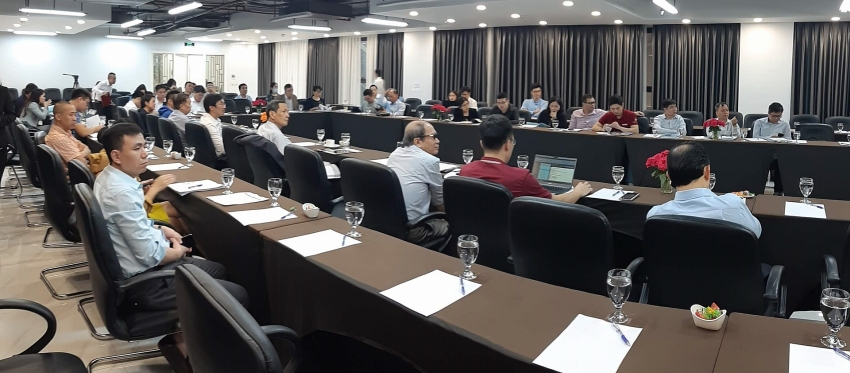UNDP promoting green chemistry GC in enterprises and universities
Currently, some universities include green chemistry (GC) as a separate course in their curriculum. For example, the Hanoi University of Industry is offering 30 periods, equivalent to two credits, of GC to third-year students in the Chemicals Technology Faculty, majoring in chemical engineering, petrochemical technology, environmental chemical technology, and food technology. Meanwhile, most universities integrate GC in other courses, instead of teaching it as a separate one.
 |
| The workshop on green chemistry was part of the UNDP’s efforts to support businesses and universities in Vietnam |
This is the result of a survey on the level of understanding and current teaching situation of GC in 44 universities in Vietnam, conducted by the project on applying GC in Vietnam to support green growth and reduction in the use and release of harmful chemicals.
This project is supported by the Global Environment Facility and the UNDP. Its main objective is to create a favourable environment for introducing GC and applications to the production industry in Vietnam and reduce the use and release of chemicals controlled under the Stockholm and Minamata Conventions.
GC is a sustainable trend for the chemicals industry in all countries. Applying GC in production helps to reduce soil and water pollution, and so to minimise the harmful impact of toxic chemicals on people’s health. It is estimated that the chemicals industry in Vietnam produces about three million tonnes of solid waste each year, of which 30 per cent are toxic waste. Therefore, it is crucial to improve the practicality of teaching GC at universities and applying it to the production process.
Luu Hoang Ngoc, deputy director-general of the VCA, said that all chemical activities aim to develop the sustainability of Vietnam’s chemical industry and to protect the environment.
“We hope that students majoring in chemistry will also be knowledgeable and experienced in sustainable development and GC,” Ngoc said.
Vu Dinh Tien, vice dean of School of Chemical Engineering under Hanoi University of Science and Technology, also shared, “We have started to make GC an official subject for the students enrolling in 2020. However, to make this subject relevant to business practice, we need support from the project and international experts.”
Hoang Thanh Vinh, programme analyst of the UNDP Vietnam, also said, “We have several small funding for activities related to environmental protection, green chemistry, and sustainable development for businesses.”
He also emphasised that within the framework of the project, the UNDP was ready to mobilise experts to consult and assist the universities, businesses in applying green chemistry, designing wastewater treatment systems, or advanced technical solutions.”
At the workshop, the universities’ representatives also had an opportunity to listen to big businesses in Vietnam discuss their current practices in applying GC in Vietnam.
“Our company is developing many technical solutions during the paper production process such as a change in washing technology, water recirculation, applying new materials, investing in renovation, and upgrading motors and lighting systems,” said Ngo Tien Luan, head of the Technical Department at Vietnam Paper Corporation. “For a business that wants to develop to protect the environment, in addition to using completely new technologies or replacing entire production lines, we also need to make use of available resources, promote technical innovation initiatives, with priority given to energy-saving solutions and application of technical advances in production.”
Businesses representatives also shared that they were willing to cooperate with the project and the universities to share their practice and create a chance for students to learn their practical experiences in applying GC.
What the stars mean:
★ Poor ★ ★ Promising ★★★ Good ★★★★ Very good ★★★★★ Exceptional
Related Contents
Latest News
More News
- Trung Nam-Sideros River consortium wins bid for LNG venture (January 30, 2026 | 11:16)
- Vietnam moves towards market-based fuel management with E10 rollout (January 30, 2026 | 11:10)
- Envision Energy, REE Group partner on 128MW wind projects (January 30, 2026 | 10:58)
- Vingroup consults on carbon credits for electric vehicle charging network (January 28, 2026 | 11:04)
- Bac Ai Pumped Storage Hydropower Plant to enter peak construction phase (January 27, 2026 | 08:00)
- ASEAN could scale up sustainable aviation fuel by 2050 (January 24, 2026 | 10:19)
- 64,000 hectares of sea allocated for offshore wind surveys (January 22, 2026 | 20:23)
- EVN secures financing for Quang Trach II LNG power plant (January 17, 2026 | 15:55)
- PC1 teams up with DENZAI on regional wind projects (January 16, 2026 | 21:18)
- Innovation and ESG practices drive green transition in the digital era (January 16, 2026 | 16:51)

 Tag:
Tag:

























 Mobile Version
Mobile Version